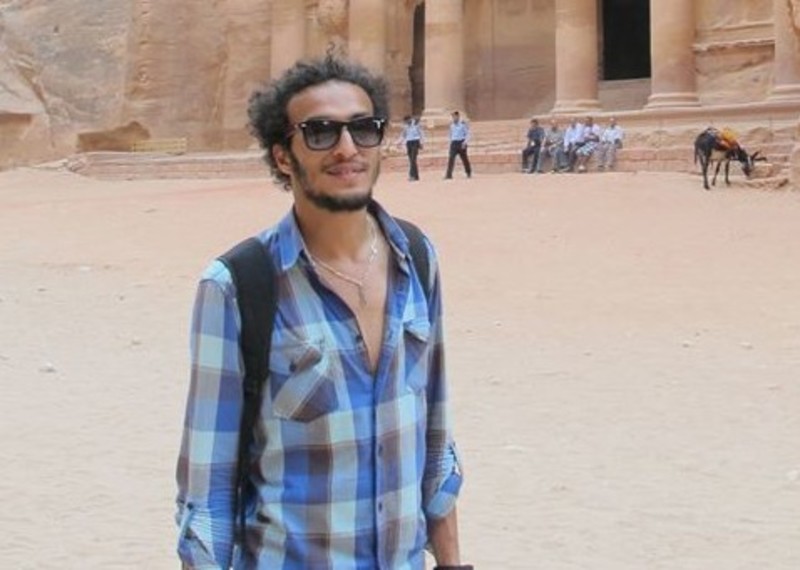Egyptian photojournalist Mahmoud Abu Zeid (known as “Shawkan”) has spent nearly 1,000 days in jail after photographing the violent response of security forces to a sit-in protest in Cairo. He has been tortured in detention and now faces trumped-up charges which could lead to life imprisonment. Ahead of his trial on 26 March, he sent Amnesty this letter about his experiences in prison.
At 7:45am, a tall, hard-hearted and thick-minded informant with barely recognizable facial expressions shows up; his accent betrays his countryside origins. His mission and assignment inside the prison, like his other “team” members of informants, are to stand near your head and shout the following: “Stand up buddies, all of you; it is inspection time”.
I want any sane person to answer me: What is going on? Why am I being unfairly placed in solitary confinement?
Shawkan, photojournalist
These informants are alike in terms of traits, characteristics and expressions – perhaps they only differ in height from each other. They all have small faces, untidy moustaches, bald heads, sunken eye sockets with flat palms and long arms that match their stature. This was the third time we were being searched this month, the 26th time by the Prison Authority within the last 900 days, and the 95th time by the Prison Intelligence service. The lion’s share of such incidents is by Mr Selim, chief of intelligence, who conducted them in person this time.
Denigrating looks and verbal insults
I lazily and gradually opened my sleep-heavy eyes; it sank in slowly – I realized it was another inspection. Leaving all my belongings inside the cell, I went outside with my cell-mates and the physical tap-search for every one of us. We lined up next to each other like slackers for the inspection to take place under the supervision of the chief prison informant. An hour passed by with all the denigrating looks and verbal insults one can think of.

The cell was ransacked, all of our belongings scattered around, and the clothes torn and insulted like their owners. Another hour passed by; it seemed that it was quite serious this time as all the prison informants and their boss were conducting the inspection. Can you imagine what it would be like to have 10 people searching a 2×1.8m cell!!?
I stood wondering to myself: “What is this? Am I the [Muslim Brotherhood] Supreme Guide? Or am I [Al-Qaeda’s leader Ayman al-] Zawahiri? But Zawahiri left prison years ago? So what is this? Why does this happen to me? So, could I be [leader of the armed group calling itself the Islamic State] Abu Bakr Al-Baghdadi? This whole commotion just for inspection!?”
Cruelty, harshness and insult
By the way, each time there is an inspection, the informants steal our belongings. On top of that, my colleague’s eye glasses were crushed in the cell; this poor guy, Iskander, has nearly lost his eyesight. All that remained of the poor eye glasses were under the guy’s foot like corn kernels in the mill. Nothing was left over. Regardless of the justifications they might resort to, nothing really justifies a human being to be treated with this cruelty, harshness and insult.
These questions remain with no answers for me except that it is a matter of persecution by the chief informant. But what have I done to deserve his oppression? The two of us have nothing personal going on between us inside or outside prison to justify me being insulted and searches for the third consecutive time this month. He spared all the prison criminals, the Brotherhood, and ISIS inmates only to oppress a journalist who was betrayed during the performance of his duty and thrown in prison for a nearly a thousand days without being able to see the judge.

Is his behavior individual or prompted by instructions from his superiors to persecute me? If so, the state, represented by the government, has decided to leave its Brotherhood and ISIS enemies to teach a journalist a harsh lesson – a journalist who has no affiliation but to his profession; a journalist who answered the call of the government itself to cover the dispersal of the [Rabaa al-Adaweya] sit-in.
Why all this oppression and persecution?
I want any sane person to answer me: What is going on? Why am I being unfairly placed in solitary confinement?
Has it not been enough to have spent almost 1,000 days in detention unfairly and on false grounds? A thousand and one nights?
Why are my two elderly parents being prevented from seeing their son after being dragged for 8 hours and a full day to bring me things I need?
Why on earth do 10 men search a matchbox-like cell for two hours?
Although the inspection failed to find any violation, “the informant block” threatens to come and search again. What does the chief informant and his men want from me?
Why all this oppression and persecution? Has it not been enough?
Take action
Shawkan was arrested on 14 August 2013, while photographing Egypt’s darkest day, the security forces’ violent dispersal of the Rabaa al-Adaweya sit-in in Cairo, which led to the killing of more than 600 protesters in one day. Amnesty International considers Mahmoud Abu Zeid to be a prisoner of conscience, who has been arrested and detained for solely peacefully exercising his right to freedom of expression. Ahead of his trial on 26 March, please tell the authorities to release him immediately and unconditionally, and drop all charges against him.


